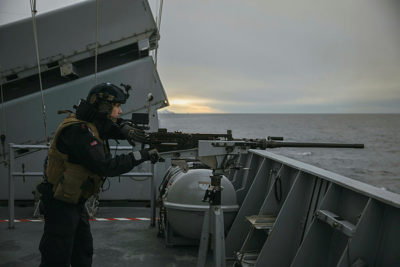Just weeks after NATO conducted military exercises in the Barents Sea, and now has forced Norway’s northern city of Tromsø to receive nuclear-powered submarines, Russia is responding with major exercises of its own. Russian officials are calling the NATO exercises off Norway a “provocation,” while the Norwegians say they haven’t been officially informed about them.

Rear Admiral Alexander Moiseyev, commander of Russia’s Northern Fleet, told the Russian defense department’s own website Krasnaya Zvezda that the exercises “aren’t directed at anyone,” but they’ve been planned “because of the international situation.” The Barents Observer, a Kirkenes-based news service, quickly picked up on Moiseyev’s remarks and then Norwegian Broadcasting (NRK) did so as well.
A spokesman for the Norwegian defense forces told the Barents Observer that Norway had not been informed of the looming Russian exercises through any “formal channels.” Like NATO, however, Russia and all other countries are free to conduct exercises in international waters.
NRK reported that Sergey Rudskoj, chief of operations in the Russian military, complained to Russian news bureau TASS that NATO forces had practiced meeting targets in Russian territory and fending off Russian ballistic missiles. “We viewed that as a provocation,” Rudskoj reportedly told TASS, “even though the USA warned us of an exercise shortly before its naval forces arrived in the Barents Sea.”
No such warning has come from the Russians, even though Krasnaya Zvezda reported that the Russians plan to mobilize 30 military vessels, more than 20 military aircraft, submarines and supply ships. Moiseyev wouldn’t say exactly when the exercises would begin, but they will be in June.
Rising tensions ‘not good for Norway’
“This is part of the geopolitical tension between Russia and the west,” Svein Vigeland Rottem, a researcher at Norway’s Fridtjof Nansen Institute, told NRK. He doesn’t think the planned Russian exercises are a direct response to NATO’s own exercise, “but are part of a bigger pattern of reaction and response over what they see in the Arctic.”
Rottem said the exercises create more tension that’s not good for Norway, which should use its own diplomatic role as a Russian neighbour that’s also part of NATO. “We can’t sit passively and watch how this tension is building,” Rottem told NRK. NATO’s exercises in May involved British and American naval forces and Norway was not part of them.
Jørn Hammarbeck, spokesman for the Norwegian defense’s operative headquarters downplayed the Russian exercises and didn’t want to make them a problem. “There’s nothing to indicate this is a response to (NATO’s) exercises in May,” he told NRK. “Russian (military) activity has steadily increased. Like other countries, they have both small and large exercises all year long.”
‘Following our routines’
Hammarbeck said Norway “will follow our own routines and what happens in our areas of interest. We have dialogue with Russia through various channels. We expect them to follow international regulations in connection with this exercise, and have good experience with that.”
NATO, meanwhile, has shaken up politicians in Tromsø after deciding to berth US nuclear-powered submarines in city-owned harbours. Since Norway’s own military has sold off its naval bases in the area, there’s now nowhere else to tie up.
Norwegians tend to be skeptical towards nuclear power and Jarle Heitmann, a Labour Party politician and leader of the board of Tromsø’s harbor authority, is not pleased. “This is not a good solution for us,” he told newspaper Klassekampen. “We would rather not see the harbours used for this.” Now one of the US subs will be berthed at Grøtsund and another in Tromsø itself. Local officials can’t object, since they’re bound by a law that harbours are obligated to receive all types of vessels.
NewsInEnglish.no/Nina Berglund

